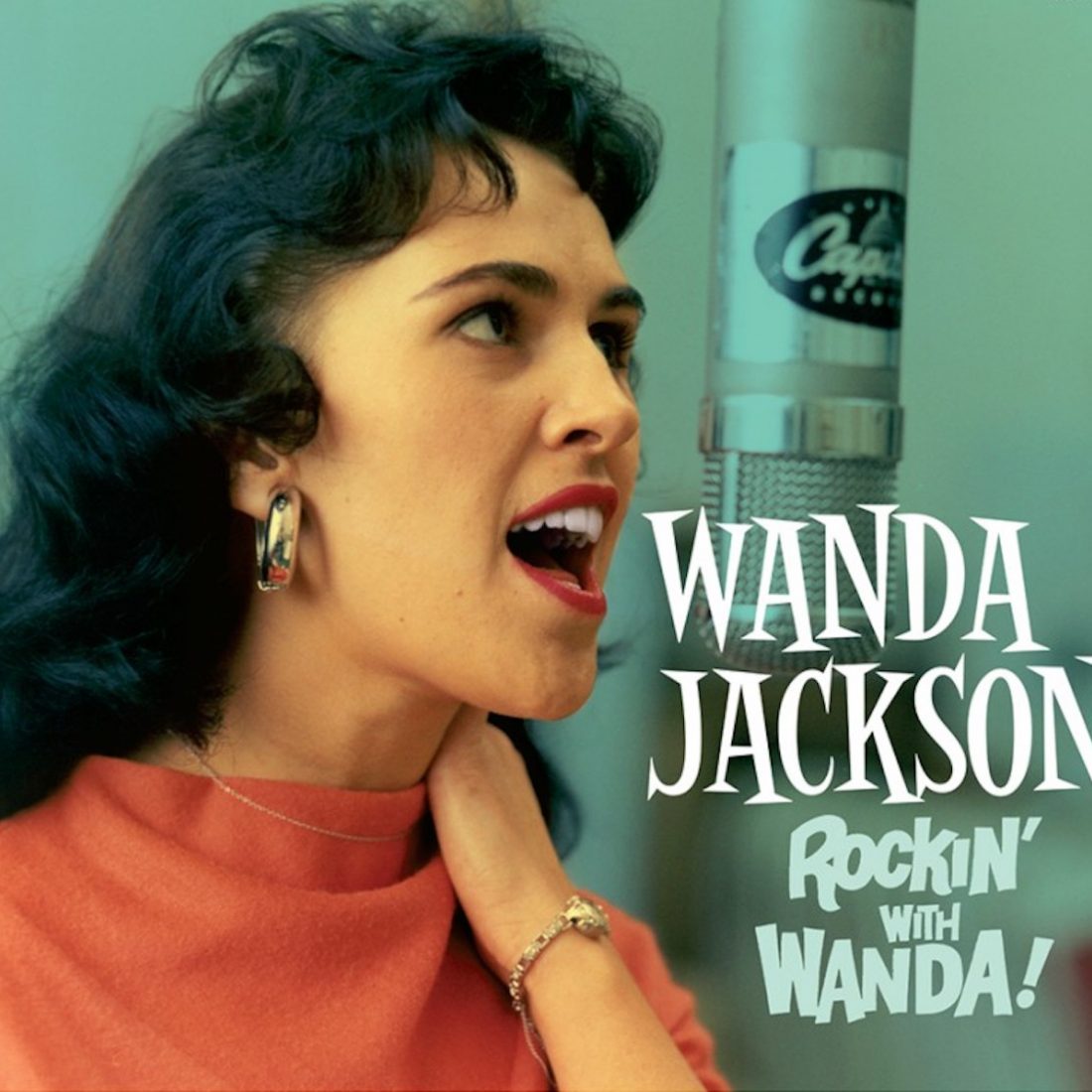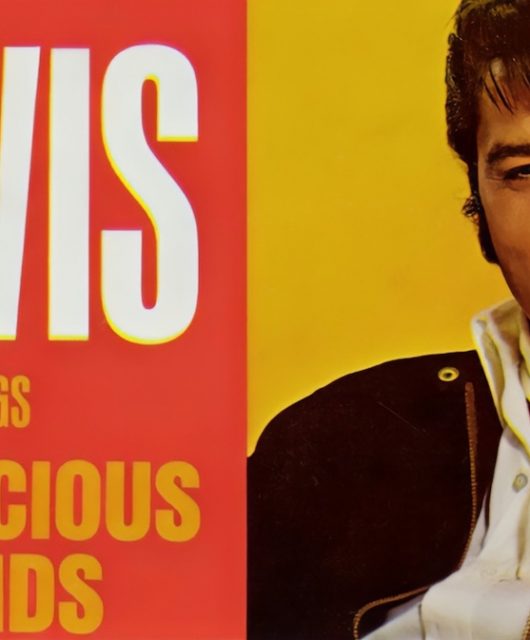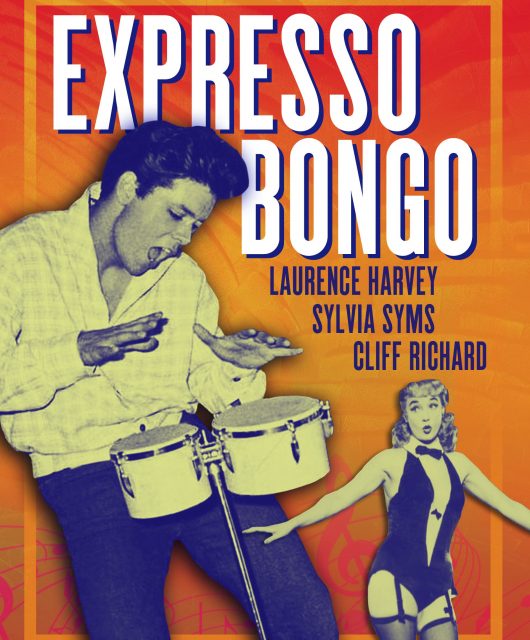From country roots to rock’n’roll royalty, Wanda Jackson will be forever remembered as the Queen Of Rockabilly. Join Vintage Rock as we celebrate the Oklahoma hurricane in heels!
After a journalist once dubbed her the ‘sweet lady with the nasty voice,’ Wanda Jackson would often joke: “Well, I don’t know if that’s right, because I’m not sure I’m a sweet lady at all!” That writer’s portrait has remained however, and the Queen Of Rockabilly is celebrated today for a singing style so strong it could blow doors off hinges and possessing a voice so powerful it would ultimately break down the barriers of resistance for all aspiring women in rock’n’roll. Switching from playful country kitten purr to rebellious rockabilly wild cat roar, Jackson was a leading lady who would ultimately pave the way for every generation of female artist that has followed.
The first lady to make a mark in the male-dominated world of 1950s rock’n’roll, Wanda was the original Wonder Woman. Seventy years on from her debut recording, Vintage Rock celebrates a sublime singer who sizzled in the studio and wasn’t afraid to be sexy on the stage. As she writes in her 2017 autobiography, Every Night Is Saturday Night: A Country Girl’s Journey To The Rock & Roll Hall Of Fame: “I hope I made it a little easier for gals to embrace their femininity and recognise that it’s okay to be sexy and be a good country girl at the same time.”
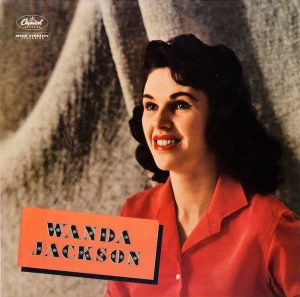
Rockin’ With Wanda
Born 20 October 1937, in the rural town of Maud, Oklahoma, Wanda’s parents Tom and Nellie Jackson would both prove incredibly supportive throughout her career. Her father was a professional musician who played fiddle, guitar, and sang at dances in towns around the state. Her parents recognised their daughter’s devotion to music when she was very young.
Every Saturday night they would listen to the Grand Ole Opry and, when attending local dances, young Wanda would race up to the stage where she would be captivated by the singers. “I would stand right at the bandstand all night long,” she recalled with Ken Burns for PBS’s Country Music. “They never had to worry where I was; I was right there, looking up! And when I saw Rose Maddox… I’d seen girl singers before, but this one – she was feisty; played that bass, you know, like a guy. She really got after it and sang. I thought, that’s what I want to do when I grow up. I want to dress like that and be on stage!”
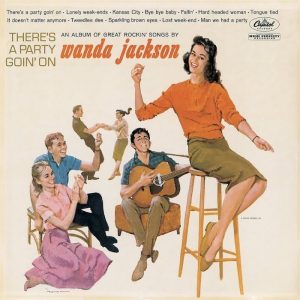
Girl Power
At the age of six, her father gifted her a guitar and Wanda swiftly set about learning her first chords. She was soon proficient enough to play alongside her father and they would sing together almost every night. “All
I wanted to do was sing and play music,” she wrote in her autobiography, and young Wanda wouldn’t have to wait too long before she’d be on the road to stardom.
Encouraged by her friends to audition for Oklahoma’s KPLR-AM station, a teenage Jackson soon landed a regular spot performing country hits after impressing the station’s jockey. It was after one radio session that she received the phone call, which would not only change her life but also write a new chapter in music history.
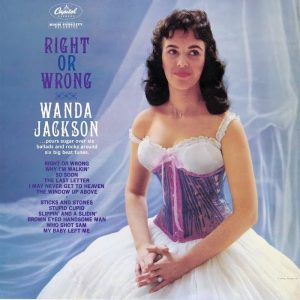
There’s A Party Goin’ On
In 1952, Jackson was heard on the air by honky-tonk Western swinger Hank Thompson, who had recently scored his first No.1 single in the Billboard Country chart with The Wild Side Of Life. “Hank Thompson calling me is still the most thrilling moment of my life,” she states in the 2008 documentary, The Sweet Lady With The Nasty Voice, directed by Vincent Kralyevich and Joanne Fish. “He asked me to come down and sing that coming Saturday night with The Brazos Valley Boys at the Trianon Ballroom and I thought, ‘Man, I’ve hit the top now!’”
Enamoured, Thompson took the precocious young talent under his wing and became Wanda’s mentor, arranging her first recording session and cut a demo. “Hank had a little studio in his house,” Wanda told Vintage Rock in 2018. “He brought it over to Ken Nelson, who was part of Capitol Records’ country division, who said, ‘Women don’t sell records’… So, Hank brought the dub over to Decca, and they signed me.”
While Jackson acknowledged that Nelson was reflecting the nature of the music industry at the time, the comment instilled a determination within her to prove him wrong… a feat she immediately achieved with her Decca debut You Can’t Have My Love. Cut in Hollywood on 24 March 1954 as a duet with Billy Gray, it was a national Top 10 hit, peaking at No.8 on Billboard’s Most Played C&W in Juke Boxes chart when released two months later.
Glitz & Glamour
Within a year Jackson realised another dream when she appeared at the Grand Ole Opry. Sadly, the occasion was to be blighted by a significant moment in the singer’s inspirational story. For her landmark performance, Jackson’s mother had made her a dazzling dress to help her daughter stand out. “At that point I was wearing western clothes – cowboy boots, western shirt with the piping and a hat – but I knew I didn’t feel good in those,” she recalled in the Kralyevich and Fish film. “Mother, being a professional seamstress, got my own style: lower cut dresses, spaghetti straps, silk fringes, long shiny earrings. I was a big fan of Marilyn Monroe and wanted to look glamorous or sexy I guess.”
However, back in 1955, Jackson’s attire proved perhaps a little too provocative for a conservative male-dominated establishment like the Opry. “I took off my jacket and got my guitar out and was waiting in the wings, ready to go on,” she told Vintage Rock. “Ernest Tubb came over and said: ‘You’d better get dressed, because you’re on next’. I said, ‘Get dressed? I am dressed’. He said: ‘No honey, you can’t show your shoulders on the stage of the Grand Ole Opry’… I was so mad and upset, it was all I could do to keep from crying. When I got off, I found Daddy and said: ‘Get me outta here fast! I’m never coming back.’”
Disheartened by the country music traditionalists of Nashville, the singer turned west towards neighbouring Memphis where a sensational new sound had been developing and the place where fate was about to deal Wanda her true calling card.
Rockabilly Fever
Having decided to manage his daughter full-time and hoping to introduce Wanda to a wider audience, Jackson’s father reached out to Memphis music promoter Bob Neal to see if he could arrange a tour. After being presented with an acetate of Elvis Presley’s first record to plug on WMPS radio by Sam Phillips, Neal had also been charged with the responsibility of arranging the first live performances for Sun Records’ hottest new property.
Looking to add a girl to his bill, the timing really couldn’t have been more serendipitous for the sweet gal from Oklahoma. “It wasn’t unusual for me to be on a bill with Johnny Cash, Buddy Holly, Carl Perkins, Jerry Lee Lewis… all these greats,” Jackson revealed in The Sweet Lady With The Nasty Voice. “They weren’t superstars then, but they were my buddies and we had a lot of fun on the tours.”
Like countless others, Jackson developed a crush on Elvis. The feeling was mutual and a special relationship soon developed. The pair started dating after Presley asked if she would be his girl and offered her his diamond ring, which she would wear on a necklace. Writing in her book, Wanda stated that Elvis: “Won my heart as I was just beginning to understand what it really meant to embrace my femininity and express myself as
a young woman.”
Rock Your Baby
Indeed, it was while playing her some blues records in his bedroom that the future King suggested she spiced up her sound by turning her hand to rockabilly. A daunting proposition for a gal who considered herself a country singer.
Talking with Fox News in 2017 she said: “The thing that Elvis did for me was give me the courage to sing this new music. I would tell him, ‘I can’t do that because I’m just a country singer! Besides, I’m a girl. I can’t sing that stuff.’ He said, ‘I know you could if you try’.”
When Decca released her from her contract in 1956, Jackson decided to give it a shot after finally securing a deal with Capitol Records. Written by Thelma Blackmon, I Gotta Know, was a perfect transitional track which mixed both maudlin country balladry with rollicking rockabilly. The single struck a chord with listeners and gifted her a second hit when it rose to No.15 on the Billboard Country singles chart. “I was really more shocked than anybody that I could sing like that,” Jackson remembered to Vintage Rock.
Indeed, you only need listen to her version of Let’s Have A Party, originally recorded by Elvis for the movie Loving You, and compare the two and you will conclude that Wanda’s party sounds the wilder of the two.
Wild Wanda
While Wanda wowed the unsuspecting listeners, it also left her label a little perplexed. Talking at the Rock And Roll Hall Of Fame in 2009, she said: “Capitol didn’t know what to do with me. They signed me as a country artist and now all of a sudden I’m singing this new music. But Ken Nelson [producer] gave me the freedom to choose my own material and do it however I wanted to… Nobody was writing rockabilly songs for girls so I just started writing them for myself.”
Similarly, and just as important, nobody else sounded like Jackson, as she acknowledged in her memoir: “I was never interested in trying to sound like anybody else. Daddy always told me to do it my way.”
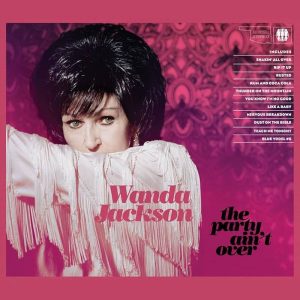
The Party Ain’t Over
While admitting that when rock’n’roll struck it was like being “in the middle of a hurricane”, she would still release some of the most hard-hitting tracks of the era. Straight-up rockers like Hot Dog! That Made Him Mad, Fujiyama Mama, Honey Bop, Mean, Mean Man and Rock Your Baby, might’ve missed out on the US chart action they warranted, but the songs still managed to muscle their way into the party and highlight how the ladies could easily hold their own alongside the boys… if only 1950s radio was ready for a full-on ‘hard headed woman’ like Wanda Jackson.
Reasoning with Smithsonian Magazine’s Kenneth R. Fletcher in November 2008, a rational Jackson explained: “They didn’t want to accept Elvis, Carl Perkins, Jerry Lee Lewis… but they didn’t have much choice because that’s what the people wanted to hear. But they weren’t going to accept a teenage girl, dressing the way I dressed, and singing this wild devilish music, as they called it.”
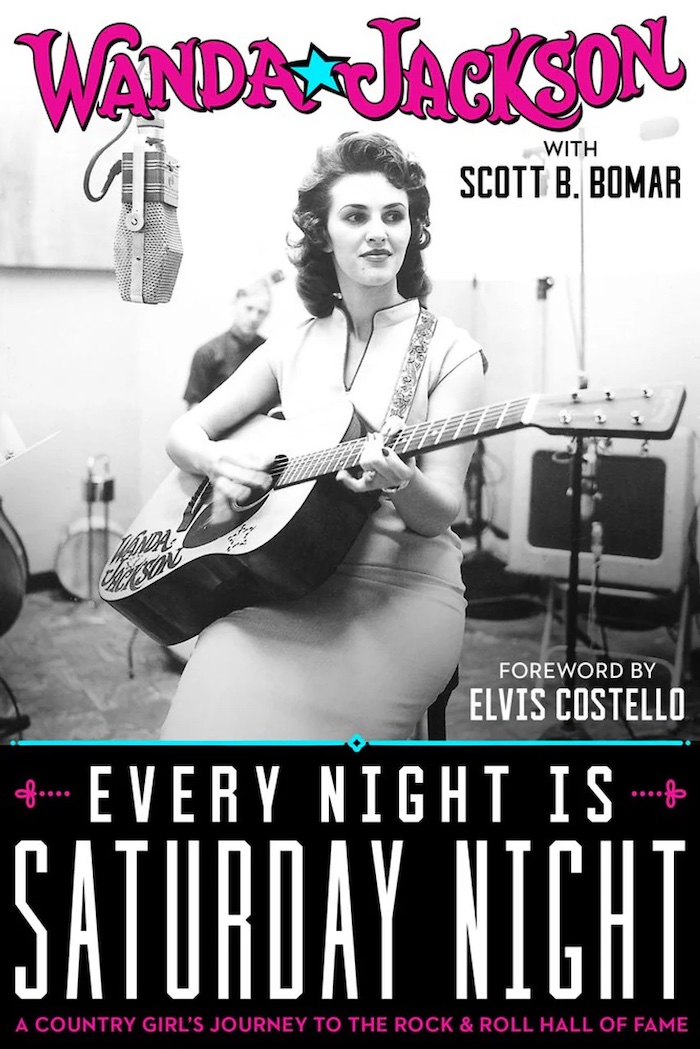
Hard Headed Woman
Despite the lack of chart success in the US, Wanda’s voice resonated around the world. Fujiyama Mama was a major hit in Japan where, according to Girls Rock!: Fifty Years of Women Making Music. Here in the UK, her wild take on Let’s Have A Party, written by Jessie Mae Robinson and recorded by Presley in 1957 for the movie Loving You, and her own Mean, Mean Man would both break the UK Top 40 in September 1960 and February 1961 respectively.
However, when rock’n’roll’s dominance started to wobble in the US, Wanda drifted back to her roots. Country-filtered releases like Right Or Wrong, featuring the sublime Funnel Of Love on the flip, and In The Middle Of A Heartache, backed by the equally magnificent I’d Be Ashamed, endured and became Top 10 hits on the Billboard country chart. “I wanted to record whatever I wanted to record, but I also understood that Capitol Records had made an investment in me,” she explained in her memoir.
Anyone familiar with the rockin’ Wanda story will be more than aware that her journey doesn’t end here. After embracing gospel and Christian music alongside country, Jackson triumphantly returned to the scene she loved during the great rock’n’roll revival of the mid-80s and she continued to fly the flag for rockabilly right up until her retirement from performing in March 2019 at the age of 81.
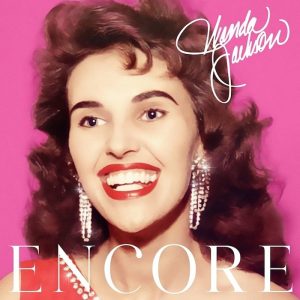
All Hail The Queen
As the sub-title to her book justifiably celebrates, Wanda was indeed inducted into the Rock And Roll Hall Of Fame – albeit long overdue – in 2009. During her acceptance speech, she acknowledged how: “In the 50s when I had the nerve to jump out there and be the only girl recording and singing all this wild stuff, with my fringe flying and my guitar twanging, I didn’t ever get any recognition.”
Well, it is inconceivable to imagine now how the music landscape would’ve developed without the pioneering powerhouse, Wanda Jackson.“I always wanted to be self-confident and I never did have that,” Wanda claimed in The Sweet Lady With The Nasty Voice, “but the stage was my kingdom and I ruled!” And this is why Vintage Rock, and countless artists around the world, all hail her as The Queen Of Rockabilly.
Did you enjoy this article? Why not check out When Rockabilly Shook The World
Subscribe To Vintage Rock Magazine Here

